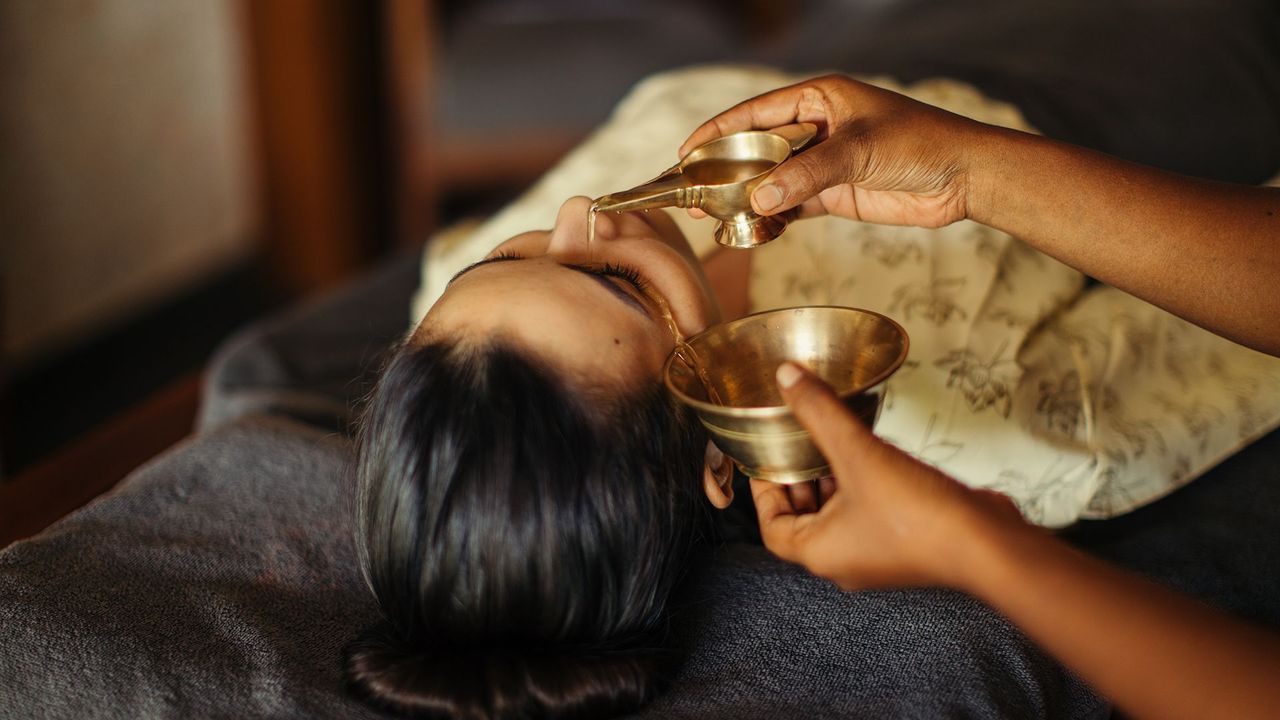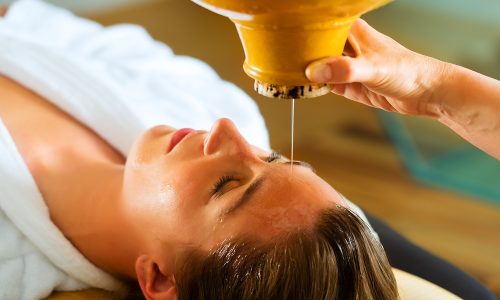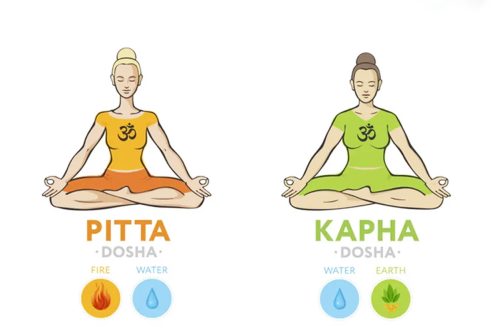Digestive Health
August 5, 2025Cervical Spondylosis
August 6, 2025Stress & Sleep Disorders
Stress & Sleep Disorders

Natural Ayurvedic Therapies for a Calmer Mind and Deeper Sleep
In today's fast-paced world, stress and sleep disorders have become increasingly common, affecting people of all ages. Whether it's due to demanding work schedules, emotional strain, digital overstimulation, or irregular lifestyle habits, mental health often suffers silently—leading to chronic anxiety, insomnia, and fatigue. While many rely on sleeping pills or temporary solutions, Ayurveda offers a holistic and side-effect-free path to restore inner balance, calm the nervous system, and promote deep, restful sleep.
At Dr. Nischal Sharma’s Panchakarma & Ayurveda Centre, our goal is to treat the root cause of mental unrest—not just suppress the symptoms. Using a combination of age-old herbal formulations, detox therapies, lifestyle corrections, and mind-soothing practices, we help you naturally reduce stress hormones like cortisol, enhance mood stability, and enjoy rejuvenating sleep—without dependency on sedatives or synthetic pills.
Our Ayurvedic Approach to Stress & Sleep Management
We combine personalized herbal remedies, Panchakarma therapies, calming routines, and guided mindfulness practices to help your body and mind naturally recalibrate.
1. Shirodhara (Oil Stream Therapy)

A deeply relaxing treatment where warm, medicated oil is poured continuously over the forehead (Ajna Chakra). It soothes the nervous system, reduces anxiety, and induces a meditative, sleep-friendly state. Shirodhara is especially effective for Vata-related mental disorders.
2. Abhyanga (Ayurvedic Oil Massage)

Gentle full-body massage with herbal oils balances Vata, improves circulation, releases muscular tension, and promotes a deep sense of calm. Regular Abhyanga also improves lymphatic drainage and enhances sleep quality.Regular practice of Abhyanga stimulates the lymphatic system, helping to eliminate toxins (Ama) from the body and boosting immunity. It also supports skin health, making the skin supple, radiant, and well-nourished. From a psychological perspective, the soothing touch involved in this massage activates the parasympathetic nervous system, promoting a sense of safety and relaxation that enhances mental clarity and emotional stability. Most importantly, Abhyanga has a profound impact on sleep quality—by pacifying excess Vata and relaxing both body and mind, it creates ideal conditions for deep, restorative sleep. In today’s fast-paced and stressful lifestyle, incorporating Abhyanga into your routine can serve as a grounding anchor—a self-care practice that brings stillness, healing, and harmony.
3. Nasya (Nasal Detox)

This therapy involves administering herbal oils or ghee into the nostrils. It cleanses the sinuses, calms the brain, and improves the flow of prana (life force), supporting mental clarity and emotional balance.In Ayurveda, the nose is considered the doorway to the brain and consciousness. Through Nasya, prana—our vital life force—is able to flow freely, enhancing oxygenation to the brain and improving overall neurological function. Regular Nasya therapy making it an excellent therapy for those experiencing anxiety, brain fog, insomnia, or restlessness.
Understanding Stress & Sleep Disorders in Ayurveda
In Ayurveda, stress and insomnia are seen as a disturbance of the Vata dosha, particularly Prana Vata, which governs the mind, nervous system, and sensory perception. When Vata is imbalanced—due to overthinking, irregular eating, late nights, or overstimulation—it causes the mind to become restless, anxious, and overly active. This results in poor-quality sleep, racing thoughts, light sleep cycles, and frequent awakenings.
Imbalance in other doshas also plays a role:
-
Pitta imbalance
-
Kapha imbalance may lead to sluggishness during the day and lack of deep sleep at night.

Ayurveda emphasizes that quality sleep (Nidra) is one of the three pillars of health, alongside proper digestion and balanced sexual energy. Therefore, treating insomnia or chronic stress is not just about rest—it’s about restoring harmony to the entire system.However, when this dosha becomes aggravated due to poor diet, lack of movement, oversleeping, or emotional suppression, it creates excessive heaviness and stagnation. People with Kapha imbalance may find it difficult to wake up refreshed in the morning, even after a full night's sleep, and tend to feel dull or fatigued throughout the day. Ironically, despite this daytime drowsiness, they often struggle to achieve deep, restful sleep at night, leading to a disturbed circadian rhythm.

4. Herbal Supplements

We prescribe powerful yet gentle herbs such as:
-
Ashwagandha – an adaptogen that lowers cortisol and balances energy
-
Brahmi – enhances memory, calms the mind, and reduces anxiety
-
Tagara (Indian Valerian) – promotes deeper sleep without grogginess.
-
Jatamansi – balances the nervous system and improves sleep architecture.
All our herbs are GMP-certified, natural, and customized to your dosha profile and condition severity.
5. Dinacharya (Daily Routine Correction)

We guide patients in creating a Vata-pacifying daily routine that includes:
-
Early, light dinners
-
Digital detox before bed
-
Evening foot massage with warm sesame oil
-
Meditation and breathing exercises (e.g., Anulom Vilom, Bhramari)
Benefits of Ayurvedic Therapy for Sleep & Stress Relief
Ayurvedic therapies offer a holistic and time-tested approach to managing stress, anxiety, and sleep disorders—without relying on synthetic drugs or sedatives. These therapies work in harmony with the body’s natural systems, bringing about deep healing from within. Below are the key benefits of incorporating Ayurvedic treatments into your wellness journey:
Naturally Reduces Cortisol and Adrenaline (Stress Hormones):
Through calming therapies such as Shirodhara, Abhyanga, and Nasya, Ayurveda helps reduce the levels of cortisol and adrenaline—the primary stress hormones responsible for the “fight or flight” response. As these hormones decrease, the body enters a state of parasympathetic relaxation, allowing it to repair and rejuvenate itself naturally.
✅ Promotes Deep and Uninterrupted Sleep Cycles:
Unlike chemical sleep aids that only sedate, Ayurvedic therapies restore the body's natural circadian rhythm. Treatments like Shirodhara and herbal oil massages activate the pineal gland and improve melatonin secretion, helping you fall asleep faster and stay asleep longer—resulting in truly restorative sleep.
✅ Improves Mental Clarity, Memory, and Emotional Resilience:
Regular Ayurvedic treatments strengthen the connection between the brain and the gut, which is considered the "second brain" in Ayurveda. This helps to improve cognitive functioning, reduce mental fog, enhance concentration, and boost emotional stability. Herbal formulations and therapies work synergistically to calm the mind, sharpen memory, and improve your ability to cope with daily challenges.
✅ No Dependency or Side Effects Like Chemical Sedatives:
One of the greatest advantages of Ayurvedic treatment is its safety and non-addictive nature. Ayurvedic therapies do not create dependency, withdrawal symptoms, or side effects commonly seen with synthetic sleeping pills or anxiety medications. They work gently with your body over time, offering sustainable and long-lasting results.
✅ Balances Hormonal Activity and Mood Swings:
Ayurvedic herbs and therapies support the endocrine system, helping regulate the secretion of hormones related to sleep, mood, and stress. This balance helps stabilize mood swings, irritability, and emotional turbulence that often accompany chronic stress or sleep loss, especially in women during menopause or menstrual cycles.
✅ Strengthens the Nervous System and Boosts Immunity:
Many Ayurvedic practices are designed to tone and rejuvenate the nervous system, making it more resilient to stress and fatigue. When the nervous system is calm, the immune system also functions more effectively—helping the body resist illness, inflammation, and infections that are often triggered by chronic stress or sleep deprivation.
✅ Supports Long-Term Nervous and Digestive Health:
According to Ayurveda, mental peace and digestion are deeply connected. Ayurvedic therapies not only calm the mind but also improve digestion by regulating Agni (digestive fire). This results in better nutrient absorption, reduced gut inflammation, and a more stable mood and energy level throughout the day.
Why Avoid Long-Term Use of Sleeping Pills?
In today’s fast-paced world, many individuals turn to sleeping pills as a quick solution for insomnia or disturbed sleep. While these medications might seem effective in the short term, their prolonged use often leads to more harm than good. At Dr. Nischal Sharma’s Panchakarma & Ayurveda Centre, we believe in addressing the root cause of sleep disturbances rather than masking symptoms with synthetic drugs. Here’s why relying on sleeping pills for long-term sleep support can be detrimental to your overall health:
1. Risk of Dependency and Addiction
Most pharmaceutical sleep aids, especially benzodiazepines or sedative-hypnotics, are known to be habit-forming. With regular use, the body becomes dependent on them to fall asleep. This means that over time, your natural ability to sleep without medication diminishes. As tolerance builds, individuals may require higher doses to achieve the same effect, leading to a dangerous cycle of dependency that can be hard to break.
2. Disruption of Natural Sleep Architecture
Sleeping pills do not replicate the body’s natural sleep processes. Instead, they sedate the nervous system, often disrupting the essential phases of sleep—especially REM (Rapid Eye Movement) and deep NREM sleep. These stages are critical for memory consolidation, emotional balance, and cellular repair. When sleep architecture is compromised, individuals may not feel refreshed even after several hours of rest, leading to chronic fatigue, irritability, and low productivity.
3. Grogginess and Mental Fog During the Day
A common side effect of long-term sleeping pill use is morning drowsiness or a "hangover effect." This sluggishness may interfere with your ability to drive, work, or think clearly the next day. Over time, this grogginess can turn into persistent brain fog, affecting cognitive function, memory, concentration, and overall alertness—especially in older adults.
4. Increased Risk of Mood Disorders
Ironically, medications meant to ease anxiety or promote rest can actually increase the risk of depression and anxiety with continued use. Sleeping pills interfere with neurotransmitters like serotonin and dopamine, which regulate mood and emotional well-being. Prolonged use may lead to emotional numbness, increased irritability, or a worsening of underlying psychological issues that may have contributed to sleep disturbances in the first place.
5. Poor Long-Term Health Outcomes
Multiple studies have linked regular use of sleeping pills to weakened immune function, increased risk of accidents, hormonal imbalance, and even shortened lifespan. These medications do not heal; they suppress. Over time, this suppression of the body's natural processes takes a toll on overall vitality and wellness.
🌿 Ayurveda: A Safer, More Sustainable Approach
In contrast, Ayurveda focuses on treating the root cause of sleep disturbances—whether it's an imbalance in Vata dosha, a disturbed digestive system, elevated stress hormones, or unresolved emotional tension. Through therapies like Shirodhara, Abhyanga, Nasya, and customized herbal formulations, Ayurveda promotes relaxation and balance from within.
Our treatments gently restore your body’s natural circadian rhythm, improve melatonin secretion, calm the nervous system, and cleanse accumulated toxins (Ama) that may be disrupting sleep and mental clarity.
Most importantly, Ayurvedic therapies are non-addictive and free from harmful side effects, making them a safe long-term solution for anyone seeking natural, restorative sleep.



